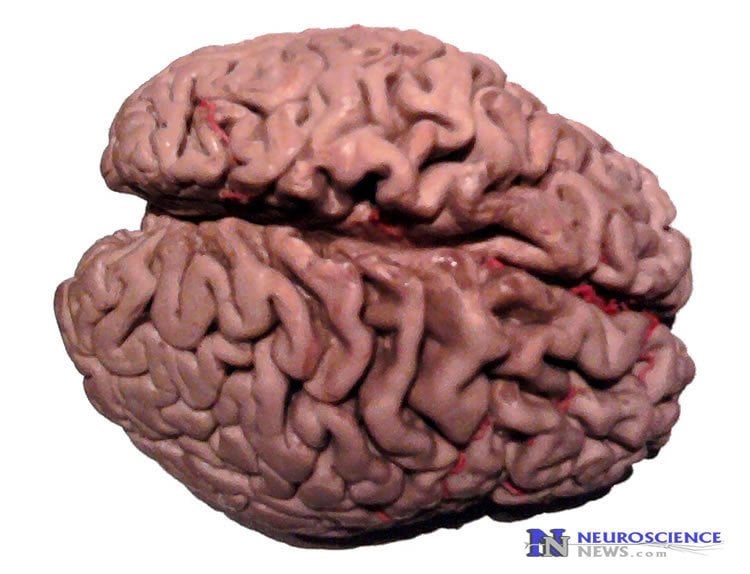Summary: In early Alzheimer’s, glycation damages an enzyme that plays a crucial role in immune response and insulin regulation, researchers report.
Source: University of Bath.
For the first time a “tipping point” molecular link between the blood sugar glucose and Alzheimer’s disease has been established by scientists, who have shown that excess glucose damages a vital enzyme involved with inflammation response to the early stages of Alzheimer’s.
Abnormally high blood sugar levels, or hyperglycaemia, is well-known as a characteristic of diabetes and obesity, but its link to Alzheimer’s disease is less familiar.
Diabetes patients have an increased risk of developing Alzheimer’s disease compared to healthy individuals. In Alzheimer’s disease abnormal proteins aggregate to form plaques and tangles in the brain which progressively damage the brain and lead to severe cognitive decline.
Scientists already knew that glucose and its break-down products can damage proteins in cells via a reaction called glycation but the specific molecular link between glucose and Alzheimer’s was not understood.
But now scientists from the University of Bath Departments of Biology and Biochemistry, Chemistry and Pharmacy and Pharmacology, working with colleagues at the Wolfson Centre for Age Related Diseases, King’s College London, have unraveled that link.
By studying brain samples from people with and without Alzheimer’s using a sensitive technique to detect glycation, the team discovered that in the early stages of Alzheimer’s glycation damages an enzyme called MIF (macrophage migration inhibitory factor) which plays a role in immune response and insulin regulation.
MIF is involved in the response of brain cells called glia to the build-up of abnormal proteins in the brain during Alzheimer’s disease, and the researchers believe that inhibition and reduction of MIF activity caused by glycation could be the ‘tipping point’ in disease progression. It appears that as Alzheimer’s progresses, glycation of these enzymes increases.
The study is published in the journal Scientific Reports.
Professor Jean van den Elsen, from the University of Bath Department of Biology and Biochemistry, said: “We’ve shown that this enzyme is already modified by glucose in the brains of individuals at the early stages of Alzheimer’s disease. We are now investigating if we can detect similar changes in blood.
“Normally MIF would be part of the immune response to the build-up of abnormal proteins in the brain, and we think that because sugar damage reduces some MIF functions and completely inhibits others that this could be a tipping point that allows Alzheimer’s to develop.
Dr Rob Williams, also from the Department of Biology and Biochemistry, added: “Knowing this will be vital to developing a chronology of how Alzheimer’s progresses and we hope will help us identify those at risk of Alzheimer’s and lead to new treatments or ways to prevent the disease.

Dr Omar Kassaar, from the University of Bath, added: “Excess sugar is well known to be bad for us when it comes to diabetes and obesity, but this potential link with Alzheimer’s disease is yet another reason that we should be controlling our sugar intake in our diets.”
Globally there are around 50 million people with Alzheimer’s disease, and this figure is predicted to rise to more than 125 million by 2050. The global social cost of the disease runs into the hundreds of billions of dollars as alongside medical care patients require social care because of the cognitive effects of the disease.
The study was funded by the Dunhill Medical Trust. Human brain tissue for this study was provided through Brains for Dementia Research, a joint initiative between Alzheimer’s Society and Alzheimer’s Research UK in association with the Medical Research Council.
Funding: Funding for this study was provided by the National Institute of Aging, the National Institute on Neurological Disorders and Stroke and the National Heart, Lung and Blood Institute.
Source: Chris Melvin – University of Bath
Image Source: NeuroscienceNews.com image is in the public domain.
Original Research: Full open access research for “Macrophage Migration Inhibitory Factor is subjected to glucose modification and oxidation in Alzheimer’s Disease” by Omar Kassaar, Marta Pereira Morais, Suying Xu, Emily L. Adam, Rosemary C. Chamberlain, Bryony Jenkins, Tony James, Paul T. Francis, Stephen Ward, Robert J. Williams & Jean van den Elsen in Scientific Reports. Published online February 23 2017 doi:10.1038/srep42874
[cbtabs][cbtab title=”MLA”]University of Bath “Sugar’s “Tipping Point” Link to Alzheimer’s Revealed.” NeuroscienceNews. NeuroscienceNews, 23 February 2017.
<https://neurosciencenews.com/alzheimers-glucose-neurology-6151/>.[/cbtab][cbtab title=”APA”]University of Bath (2017, February 23). Sugar’s “Tipping Point” Link to Alzheimer’s Revealed. NeuroscienceNew. Retrieved February 23, 2017 from https://neurosciencenews.com/alzheimers-glucose-neurology-6151/[/cbtab][cbtab title=”Chicago”]University of Bath “Sugar’s “Tipping Point” Link to Alzheimer’s Revealed.” https://neurosciencenews.com/alzheimers-glucose-neurology-6151/ (accessed February 23, 2017).[/cbtab][/cbtabs]
Abstract
Macrophage Migration Inhibitory Factor is subjected to glucose modification and oxidation in Alzheimer’s Disease
Glucose and glucose metabolites are able to adversely modify proteins through a non-enzymatic reaction called glycation, which is associated with the pathology of Alzheimer’s Disease (AD) and is a characteristic of the hyperglycaemia induced by diabetes. However, the precise protein glycation profile that characterises AD is poorly defined and the molecular link between hyperglycaemia and AD is unknown. In this study, we define an early glycation profile of human brain using fluorescent phenylboronate gel electrophoresis and identify early glycation and oxidation of macrophage migration inhibitory factor (MIF) in AD brain. This modification inhibits MIF enzyme activity and ability to stimulate glial cells. MIF is involved in immune response and insulin regulation, hyperglycaemia, oxidative stress and glycation are all implicated in AD. Our study indicates that glucose modified and oxidised MIF could be a molecular link between hyperglycaemia and the dysregulation of the innate immune system in AD.
“Macrophage Migration Inhibitory Factor is subjected to glucose modification and oxidation in Alzheimer’s Disease” by Omar Kassaar, Marta Pereira Morais, Suying Xu, Emily L. Adam, Rosemary C. Chamberlain, Bryony Jenkins, Tony James, Paul T. Francis, Stephen Ward, Robert J. Williams & Jean van den Elsen in Scientific Reports. Published online February 23 2017 doi:10.1038/srep42874






